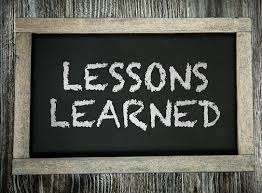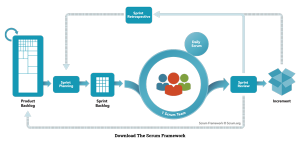Three years ago my stepson received his MBA along with a terrific job offer and moved to Washington, DC. It wasn’t long after the move that he recognized a huge void in his life – there was no place for him to grab healthy, prepared meals. Working extremely long hours, he had no time to grocery shop and cook for himself. And being a long-time fitness and nutrition fanatic, the idea of eating fast food wasn’t attractive to him. Out of this void came the idea for a new company delivering chef-prepared, dietician-approved, ready-to-eat meals.

* Image via Pattyfarmer.com
From the start, he knew he’d need advice on marketing and I was happy to jump in. Although, honestly I didn’t know how much value I could add given that my focus is nearly 100% on B2B marketing and certainly 100% on enterprise-level organizations. What I did know was the importance of eating right and the impact it can have on your life. I shared his passion and agreed that there was a place in the DC market for his offering. But what did I know about the food delivery business? And what did I know about marketing to millennials, his primary target audience? I’m not even on Instagram.
As he gets ready to launch the new business next month and I reflect over the past two years of his work I realize that there really aren’t huge differences between enterprise, B2B marketing efforts and startup B2C efforts.
The big and obvious differences in his B2C space are:
- Social media is a game changer
- Blogging is critically important
- Purchases are highly transactional. You have mere seconds to capture someone’s attention (vs. a six-month sales cycle for a large enterprise purchase).
What’s more fascinating to me than the differences, however, are the similarities.
- The importance of research
I’m sure many startups occur without much research, which is why the vast percentage of them fail. I’ve also worked with many enterprise companies who want to bypass conducting proper research. Thankfully, my stepson believes in the value of it. And since there was no piggybank to fund his effort, he knew he had to build a convincing business plan to raise the startup money. Months were spent running numbers, evaluating competitors in other geographic markets, counting customer purchases, identifying the proper target audience segments, and conducting menu tastings. One of the research areas I most often see my enterprise clients ignore is buyer research. If you don’t understand your buyers – what drives their need and purchase – then how can you market to them? The importance of understanding your buyers is something that doesn’t change between small B2C and large B2B companies.
- The importance of branding
Let’s face it, establishing a strong brand can take an inordinate amount of time and money. But the difference in effort between a small and large company is becoming smaller and smaller given Web 2.0. In today’s digital world, a small company can “look” much larger than it is. Thus, the importance of brand becomes more similar as well. In doing competitive research for the startup, we found that most brands weren’t highly professional and/or weren’t carried through entirely across the user experience. We knew that since our offering was going to be an entirely digital experience, at least in the beginning, having a unique and consistent visual brand was vital. And that meant having crisp guidelines, that ALL resources follow, across everything from logos to tone and photography. Consumers of both B2C and B2B solutions are bombarded every day more and more with marketing messages. Brands must stand out, cut through the clutter, and engage. It really doesn’t matter the size of the company or the price of the product.
- The importance of user experience
For most enterprise level companies, the thing that comes to mind when you talk about user experience is obviously the web, but what clients often do not think about is that the user experience has to carry through to any human contact as well – from a lead follow-up outbound phone call to a field sales rep meeting. Additionally, the larger the enterprise and the more complex the organization’s solutions are, the more complex the experience tends to be both on the web and in person. Internal and organizational complexities are often reflected externally as evidenced by websites that a visitor is unable to navigate (and thus abandons) or by a follow-up phone call from someone whose attitude, tone or even language doesn’t make for a pleasant user experience.
For smaller consumer-oriented companies, especially 100% web-focused companies like my stepson’s, the web user experience requires special attention. Actual purchases and subscriptions will happen on the web so everything from sign-up, to scheduling deliveries, to pausing deliveries must be on-brand and user-friendly. Carry that over to alerts when the food is on the way or the tangible experience with packaging and heating instructions once the food is delivered.
In today’s society of immediate gratification, if an unpleasant user experience occurs consumers know that there are plenty of other options literally just a click away. Because of this the importance of the user experience cannot be stressed enough, whether it’s a startup food delivery service or an enterprise organization.
For everything that my stepson thought he needed to learn from me, I’ve learned an equal amount if not more from him. It’s given me a new perspective while at the same time solidified in my mind how important research, brand, and user experience are.
Business & Finance Articles on Business 2 Community(48)





